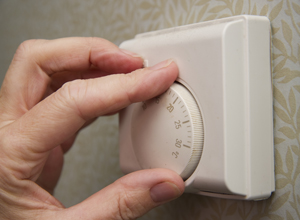Dong goes one better than energy savings
on
Dong goes one better than energy savings
Denmark is an example of a country with a successful energy savings obligation scheme. Danish energy consumption has been flat for many years. In fact, Danish energy producer Dong Energy goes one step further. It offers its large and medium-sized clients "Climate Partnerships" that not only help reduce energy consumption but also stimulate renewable energy production. Dong Executive Vice-President Kurt Bligaard Pedersen finds it strange that many energy companies in Europe resist savings obligations. "The customers demand it."
 |
The Energy Efficiency Directive proposed by the European Commission and currently being discussed by the European Parliament contains a provision requiring utilities to achieve 1.5% annual savings in the energy consumption of their customers. (See our accompanying article: Five reasons the new Energy Efficiency Directive will not work - and what can be done to remedy this.) However, at the insistence of Germany and other member states, the proposal allows for an “opt-out” that would give member states the possibility to take other measures to achieve similar results. In addition, some countries, like the Netherlands, resist obligatory schemes because they fear the bureaucracy involved in enforcing them.
Other countries, such as France and Denmark, already have energy savings obligation schemes in place. In Denmark, it is the distribution system operators (DSO’s) that have been given the responsibility by the government to realize savings among the energy users. They are compensated for their efforts through a small surcharge on the transport tariffs. If a DSO does not deliver the required results, the government withholds the surcharge. Partly as a result of this scheme, Danish energy consumption has been flat for many years. The Danish case is particularly relevant as Denmark currently holds the EU Presidency and has made energy efficiency one of its main priorities.
For Dong Energy, the state-owned Danish energy producer, the idea of saving energy for their customers has been standard practice for decades, without any legal obligations involved. Dong has been offering its large customers a "tailored service" designed to make them help save energy for many years. If the promised savings are not achieved, Dong promises to compensate its customer. The company says it achieved 340 GWh in energy savings in 2010 and 2011, equivalent to the annual consumption of 90,000 Danish households.
What is the incentive for Dong to help its customers save energy rather than maximize its own sales? According to Kurt Bligaard Pedersen, Executive Vice-President of Dong Energy, the reason is simple: their customers demand it. "If we didn't help our customers save energy, they would do it anyway, but they would look for other partners to help them. They would think we did not care about their business. That is not in our long-term interest."
Although Dong has been operating like this for a long time, in recent years the company has added a new twist. It now offers large clients, including local utilities, what it calls "Climate Partnerships". What this means is that Dong not only helps clients cut energy consumption, at the same time it makes a deal with them to invest their savings into the production or purchase of renewable energy.
Dong's first 'climate partner' was pharmaceutical company Novo Nordisk. Starting in 2007, Dong
| "If we didn't help our customers save energy, they would do it anyway, but they would look for other partners to help them" |
By now Dong has entered into more than 100 such climate partnerships. In fact, the concept has been so successful it is being marketed in Denmark as an "off-the-shelf" solution. The Danes have now even started to export their "product" to Germany. Bligaard Pedersen, who recently attended the E-World exhibition in Essen, Germany, where Dong launched the concept of Climate Partnerships for the German market, says there is great interest among the German Stadtwerke (local utility companies) to enter into climate partnerships. In Essen Dong was able to announce a first German deal with the Stadtwerke Lübeck.
Bligaard Pedersen notes that among energy users the awareness of the importance of energy efficiency is growing. He is firmly convinced that energy companies can offer their customers a unique service in this regard which they can turn to their advantage. "We have found time and again that saving energy is not the core competence of most of our customers. We have never been through a process yet that did not result in substantial savings."
As to the idea of an energy savings obligation, the Dong executive says he finds it "strange that so many in the industry resist it. I hear a lot of talk about the complications of energy savings obligations. But the point is: the customers want it. That's the only thing that matters in the end."


Discussion (0 comments)